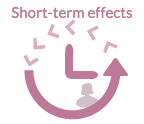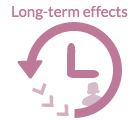What are the physical health effects of FGM/C?
Undergoing FGM/C can cause both immediate and long-term physical consequences.1 Young girls and women may experience more than one of the health complications below.

- Severe pain2,3,4,5
- Excessive bleeding2,3,4,5
- Bacterial or viral infection2,3,5
- Injury to surrounding area, including swelling2,3,5
- Not being able to urinate2,4,5

Does FGM/C affect sexual health?
Ask your patient if sex hurts. Women with FGM/C may find it harder to be sexually aroused and experience orgasm because their vascular tissue has been removed. Genital cutting damages nerve endings and makes the vagina inelastic due to scarred tissue, which causes pain during sex.8,9,10 Although some studies claim that FGM/C makes no difference in women’s sex lives, most research suggests that FGM/C, unsurprisingly, has a negative effect.11
In their own words
A survivor describes her experience speaking to a gynecologist about her constant urge to urinate:

